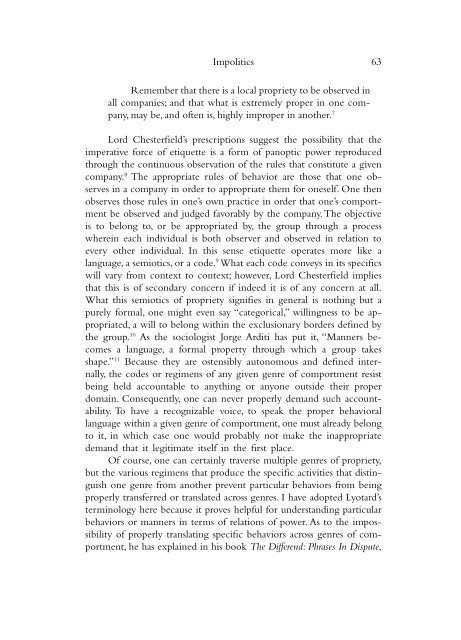You also want an ePaper? Increase the reach of your titles
YUMPU automatically turns print PDFs into web optimized ePapers that Google loves.
Impolitics<br />
Remember that <strong>the</strong>re is a local propriety to be observed in<br />
all companies; and that what is extremely proper in one company,<br />
may be, and <strong>of</strong>ten is, highly improper in ano<strong>the</strong>r. 7<br />
Lord Chesterfield’s prescriptions suggest <strong>the</strong> possibility that <strong>the</strong><br />
imperative force <strong>of</strong> etiquette is a form <strong>of</strong> panoptic power reproduced<br />
through <strong>the</strong> continuous observation <strong>of</strong> <strong>the</strong> rules that constitute a given<br />
company. 8 The appropriate rules <strong>of</strong> behavior are those that one observes<br />
in a company in order to appropriate <strong>the</strong>m for oneself. One <strong>the</strong>n<br />
observes those rules in one’s own practice in order that one’s comportment<br />
be observed and judged favorably by <strong>the</strong> company. The objective<br />
is to belong to, or be appropriated by, <strong>the</strong> group through a process<br />
wherein each individual is both observer and observed in relation to<br />
every o<strong>the</strong>r individual. In this sense etiquette operates more like a<br />
language, a semiotics, or a code. 9 What each code conveys in its specifics<br />
will vary from context to context; however, Lord Chesterfield implies<br />
that this is <strong>of</strong> secondary concern if indeed it is <strong>of</strong> any concern at all.<br />
What this semiotics <strong>of</strong> propriety signifies in general is nothing but a<br />
purely formal, one might even say “categorical,” willingness to be appropriated,<br />
a will to belong within <strong>the</strong> exclusionary borders defined by<br />
<strong>the</strong> group. 10 As <strong>the</strong> sociologist Jorge Arditi has put it, “Manners becomes<br />
a language, a formal property through which a group takes<br />
shape.” 11 Because <strong>the</strong>y are ostensibly autonomous and defined internally,<br />
<strong>the</strong> codes or regimens <strong>of</strong> any given genre <strong>of</strong> comportment resist<br />
being held accountable to anything or anyone outside <strong>the</strong>ir proper<br />
domain. Consequently, one can never properly demand such accountability.<br />
To have a recognizable voice, to speak <strong>the</strong> proper behavioral<br />
language within a given genre <strong>of</strong> comportment, one must already belong<br />
to it, in which case one would probably not make <strong>the</strong> inappropriate<br />
demand that it legitimate itself in <strong>the</strong> first place.<br />
Of course, one can certainly traverse multiple genres <strong>of</strong> propriety,<br />
but <strong>the</strong> various regimens that produce <strong>the</strong> specific activities that distinguish<br />
one genre from ano<strong>the</strong>r prevent particular behaviors from being<br />
properly transferred or translated across genres. I have adopted Lyotard’s<br />
terminology here because it proves helpful for understanding particular<br />
behaviors or manners in terms <strong>of</strong> relations <strong>of</strong> power. As to <strong>the</strong> impossibility<br />
<strong>of</strong> properly translating specific behaviors across genres <strong>of</strong> comportment,<br />
he has explained in his book The Differend: Phrases In Dispute,<br />
63
















